On Virgin Soil - Landfall in Civilization: Beyond Earth
A brave new world awaits players in Civilization: Beyond Earth, and its alien coasts and bizarre landscapes seek to challenge both new and old players. Landfall and the first fifty turns are important for the ultimate health of your colony, and knowing how to set yourself up for success can be the difference between a strong Domination victory and eking out a Time victory over the AI (or worse). While lessons learned in previous Civilization games will certainly assist a player in making the right decisions for their colony, there are a few features, recycled and new, that might challenge a player’s initial perception of their new home.
Making Landfall: Your Sponsor, Your Ship, and Your Headquarters
Sponsor
Some of the most important decisions you make for your colony’s success take place before your first turn. The selection of your sponsor is similar to previous Civilization’s civilization selection screen, but unlike in previous iterations of the franchise, your selection of a sponsor will not completely influence your play style during the game. In previous games, your selection of the Aztecs, Zulu, or Huns would predestine you to a campaign of conquest; in Beyond Earth, your selection will encourage you to take advantage of an aspect of the game, but will not determine your end-game strategy. Certain sponsors do still give advantages during different eras of the game – the Slavic Federation’s satellites and ARC’s espionage are only useful after reaching certain technologies, while Polystralia’s additional capital trade routes require stations and cities on the map to take advantage of. More important for your colony’s initial success are the decisions you make about the spaceship that your colonists used to reach Planet.
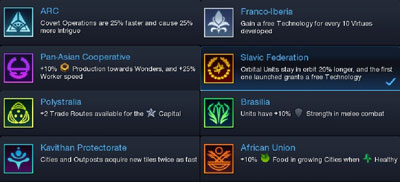
Colonists
Deciding which colonists form the backbone of your settler population is probably the most impactful decision you can make for the early game. Aristocrats and Artists provide Health, which is in demand for much of the early-mid game, allowing you to expand confidently as Colonist/Clinic mitigates half of the base Unhealth each city generates. The choice boils down to Energy or Culture, and I find myself going Artists more often than Aristocrats, as Culture allows earlier adoption of Virtues (Policies) while Energy isn’t in demand once you establish external trade routes. While the Food and Production bonuses of Refugees and Engineers might seem tempting, internal trade routes really outshine these bonuses even in the early game. The Science bonus of Scientists looks nice, but only provides 1/40th of Pioneering at the beginning of the game and is uninspiring.
Spacecraft
The spacecraft your colonists arrived to the planet on helps influence where your colony is going to expand to. Continental Surveyor, while initially looking weak, provides early naval trade routes to other coastal cities – which avoid the blocking Miasma as well as gaining bonuses if they’re intercontinental routes. It also reveals the most map of the choices, although obviously the nature of the coasts clear across the map isn’t going to be very useful information. Retrograde Thrusters gives you a much larger choice on the location of your Capital, and helps spot early Resource Pods (which give various bonuses). Tectonic Scanner doesn’t provide you any additional vision but gives you an advantage in spotting resources early, allowing you to forward settle before your rivals realize the value of the land. Lifeform Sensor provides vision across the map but it does so by providing vision of lands that are mostly useless in terms of early expansion, as alien nests only form in Miasma which batters early game units to the point where the aliens that are protecting said nests can take them out.
Cargo
Your decision on what cargo your colonists brought with you really only decides what your colony doesn’t need to do in the early game. Laboratory provides the Pioneering technology, which allows you to build trade units as well the Colonist unit, which can build new cities for you. The technology also takes the longest to develop. The other popular option is Machinery, as the free Worker not only saves the time of constructing the unit but allows you to develop your Capital’s landscape quickly. The other options (Weapons Arsenal, Raw Materials, Hydroponics) all provide nice boons, but they’re quicker to build than the technology as well as being less useful than the Worker early. Hydroponics is the cargo choice of the three that is sometimes useful, allowing you to work two tiles early which will push out the other three boons quickly.
Landfall
Deciding where to actually land your ship is just as important as deciding where to use your Settler in Civilization V. However, with no luxury resources, you’re really only hoping for a coastal hill tile, river or canyons being secondary features to be near. The coast provides better trade route options and access to Algae and Coral – rather powerful early game bonus resources. Terrestrial bonus resources are good, but there are no resources that provide Health (the major expansion gating mechanic of the game). Below are two sample starting locations, one with Retrograde Thrusters and one without.
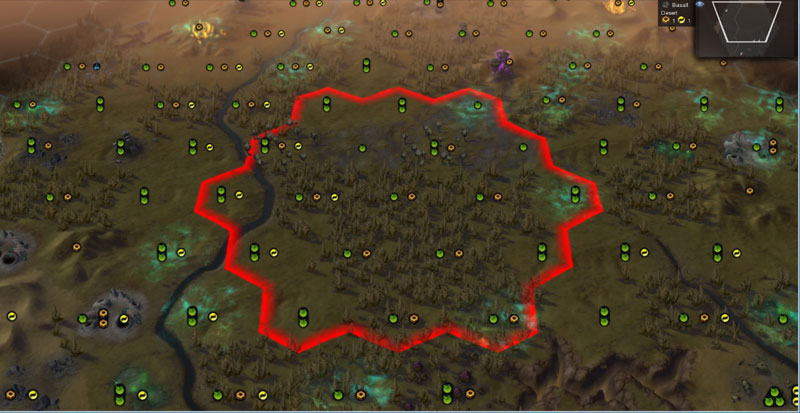
In this example, I am given a large location that lacks any access to the coast. Energy will be more difficult to gain, so I seek a river tile to center my headquarters on its banks. This will provide me one energy for each hex adjacent to the river. In terms of bonus resources, we have access to fiber and resilin, and some basalt to the west if we land on the leftmost hex. Also, the forests that dominate the center of the landing zone will provide our capital with early production and they can be “chopped” (cut down) to rush out an early Wonder. I selected the left most hex.
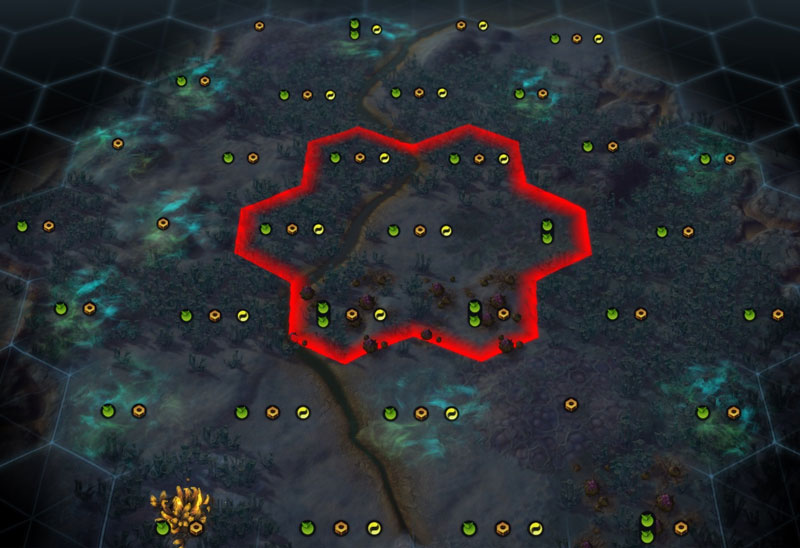
In this case, we don’t have retrograde thrusters, and our options are incredibly limited. The center hex is not adjacent to Miasma and allows us to use the two food grasslands tile to the east while remaining on the river. In this example you can see the value of Retrograde Thrusters. If I had access to them, I would go to the hex directly south of the fruits, which would clear the Miasma and give access to three sources of fruit (a good food yield) and a source of three Firaxite, the Supremacy strategic resource.
Once you land on the planet, focus on producing an early Worker and then begin terraforming every hex around your capital. Unlike in Alpha Centauri, there is no penalty for aggressively developing your new home and you can replace your uninspiring farms with terrascapes later. Send your Explorer out into the world, avoiding Miasma and staying two hexes away from Alien Nests. The aliens (outside of the dreaded Siege Worms) will leave you alone if you do so, as they’re generally passive outside their clouded homes.
Build buildings as they become available and build a Ranger to act as a defensive unit in your capital. Wonders, as magnificent as they are, are nowhere near as powerful as they were in previous games – it isn’t a game lost if you miss out on building the Gene Vault. Focus on building a sustainable city with capital, establishing all but one trade route and terraforming it’s entire landscape.
Developing a New Earth: Technologies, Virtues, and Affinities
Technology and Affinities
The replacement for the Ideology system in Civ:BE is Affinities, potential paths of human development that each have their own strengths and their own end game. They’re directly tied into the technology web, as certain leaf techs provide levels in these Affinities. Instinctually, you’re going to want to commit fully to a single Affinity, but that is actually the opposite of what you want to do. Each Affinity provides some very important bonuses and until you get to six levels in a single Affinity, your colony hasn’t chosen its path.
Purity provides a single incredible bonus in the early game – at one point, aliens will not attack your Explorers. This allows you to send them deep into the Miasma without fearing for their safety, as even aliens attempting to protect their nests will not attack your scouts. Supremacy requires three points of investment for its powerful bonus, which makes your roads upkeep free, allowing the development of your road network to not be gated by your energy income. Harmony makes the native planet easier to live on, as one point makes the aliens much more forgiving and three makes the Miasma significantly less deadly to your military units.
It’s also important not to worry about Affinity points when picking up technologies – if you want a technology, research it! Technologies like Alien Biology (Workers can clear Miasma and gives them immunity) and Vertical Farming (significant bonuses to farms) are powerful enough even without the Affinity bonuses. The only thing to keep in mind is that once you hit level six in an Affinity, it will become your colony’s dominant philosophy.
Virtues
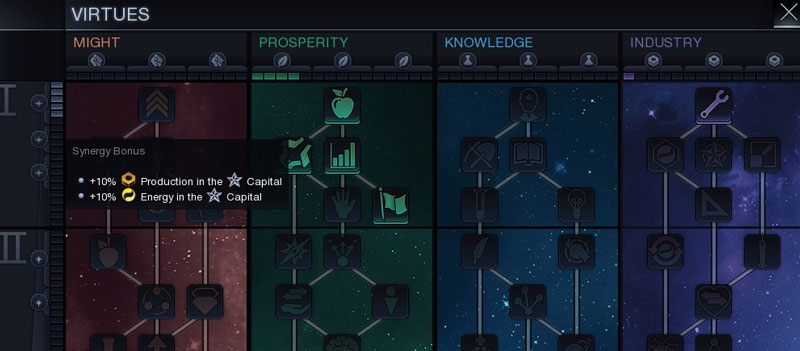
Virtues, Beyond Earth’s replacement for Policies, follow in a similar vein as Affinities. You might want to commit to a single tree by instinct, but the trees are adaptable and encourage players to pick the Virtue that has immediate benefits for them. Unlike in Civ V, you aren’t wasting Culture by going into multiple trees, as there are rewards for having a large number of Virtues in the first “tier” of the Virtue track as well as having a large number of Virtues in a single tree.
Each Virtue tree provides various bonuses – Might improves your military mettle, Prosperity improves Health and Growth (the hardest and easiest things to get), Knowledge self-perpetuates by improving your Science and Culture, and Industry improves your Production and Energy. The best Virtues for the early game are primarily in the Prosperity tree, as there are two early Virtues that give a Worker and a Colonist and investing in it leads to Mind over Matter, which gives you a sweet seven Health.
Building a Colony to Stand the Test of Time: Expansion
Soon, your capital will have built all available buildings, built a defensive perimeter and be producing so much energy you won’t know what to do with it. At this point, purchase a Colonist and send it to a good expansion spot. A few things to keep in mind: you want variety of bonus resource as opposed to monopoly, as Virtues do not reward you for building up large quantities of gold or basalt (unlike Pantheons in Civ V). You want as many strategic resources as you can, especially the "special" resource of your Affinity.
You want to forward settle the other factions as far as you believe you can reasonably defend. This will put pressure onto them and might ignite conflict between them and another faction or the aliens. This conflict is a massive drain on your rival’s resources. (They might attempt to pressure you, but the AI is atrocious at organizing their units, and ranged units combined with city barrages will shred any early aggression.)
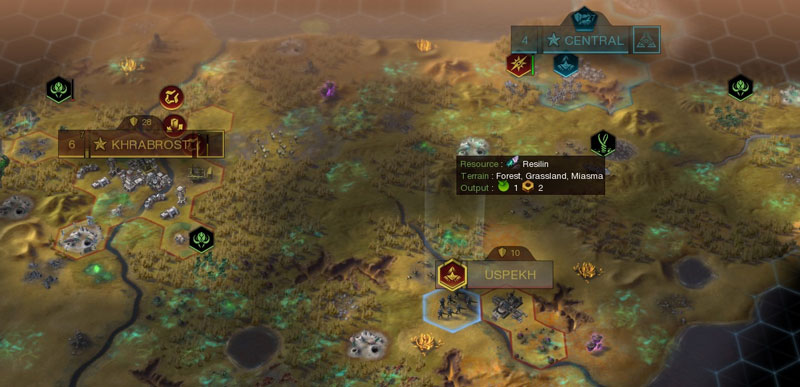
Instead of the full-fledged city that you would see in other Civilization games, your fledgling city will begin as an outpost. In this state, it is weak and cannot provide for itself. The outpost will slowly incorporate the territory around it, and this can be sped up by setting up a trade route with the final remaining trade route of your capital. After the outpost develops into a full city, this route will become a lucrative internal trade route, providing both cities with food and production.
Conclusion
At this point, you’ve established two cities on virgin soil, established trade between them and your neighbors, and started on your path to establishing human life on Planet. And while this seems like quite a bit of work, you’ve accomplished this in only the first fifty turns. The aliens will slowly either grow used to your presence or begin to try and push you off your land, and other colonies will stop viewing at you as a trading partner and begin viewing you as a threat. The orbital layer will be littered with satellites and the world of espionage is yet to begin. However, by setting yourself up with a strong base at the beginning of the game, you are in a position to adapt to everything the AI will throw at you.